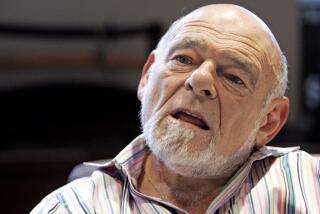Semel Takes a Surprising Path in His Search for New Challenge
- Share via
After nearly two decades as a top Hollywood mogul, Terry Semel put his handprints in cement at Mann’s Chinese Theatre on Hollywood Boulevard, as much a celebrity as some of the stars whose movies he released.
Then, Semel quietly slipped away from the glamour and perks he enjoyed as the co-chief of Warner Bros. in 1999, saying, “I never had a moment to take a long walk on the beach in Malibu and say, ‘What now?’ ”
Nearly two years after he left the pinnacle of Hollywood power, Semel, 58, finally answered that question in a way no one in the industry had expected--by getting into an entirely new line of work.
In taking the top job of running struggling Internet firm Yahoo on Tuesday, Semel spurned the business in which he had worked nearly all of his adult life and to which he had been widely expected to return someday. Instead, he chose to try to rescue a stumbling Internet pioneer badly in need of new vision.
“He felt very strongly he had another big chapter in his life. He didn’t want to do what he had done before. He’s in the Hall of Fame. Why does he want to go back?” said Los Angeles Dodgers Chairman Bob Daly, who ran Warner Bros. with Semel.
Other friends of Semel were surprised by the move. But they said the combination of his negotiating toughness, financial acumen and his widespread corporate contacts would prove valuable assets.
“It’s a brilliant move on both Yahoo’s and Terry’s part,” said Universal Studios President Ron Meyer.
Unlike Daly, a lifelong Dodger fan who immediately jumped at the chance to invest in and run the team, Semel has been working largely out of public view.
Semel had lawyers putting together a financing proposal for a deal, possibly with 20th Century Fox, to form an independent entertainment venture.
Semel also was a catalyst in helping bring Seagram Co. together with French suitor Vivendi last year. He was frequently rumored to be under consideration for senior jobs there, or possibly as the successor to Sony Pictures Entertainment Chairman John Calley.
“He could have pulled the trigger a long time ago and gone back to making movies,” Daly said.
In the end, Semel chose to try something new.
“When I came back, I wanted to have one more career,” Semel said, adding he did not “want to practice the same things I had done in the last 20 years.”
One reason Semel had passed on some of those opportunities is that he wanted a significant stake in whatever company he joined. At Yahoo, Semel is buying 1 million Yahoo shares at $17.62 each.
A wealthy man already, said to be worth hundreds of millions of dollars, Semel no doubt is getting a lucrative incentive package should he turn Yahoo around--details of which are expected to be made public soon. In addition to a home in Los Angeles, Semel has a posh New York apartment and is expected to add another home in Silicon Valley.
As Semel puts it, the days since he left Warner Bros. were spent as “a student of the Internet.”
He dabbled in the area through his investment firm Windsor Media, where he estimates he “looked at 200 to 300 different plans.” Along the way, he learned some painful lessons investing in such fiascoes as the failed Digital Entertainment Network. He surrounded himself with tech executives, some of whom had left Warner Bros.’ shuttered Entertaindom Web site, and picked the brains of friends such as financier Michael Milken.
In recent weeks, Semel’s principal subject of study was Yahoo. According to Daly, who still lunches nearly every week with him, Semel spent countless hours investigating the company, even interrupting a Hawaiian vacation two weeks ago to travel to Japan to meet executives with Yahoo investor Softbank.
More important, he befriended Yahoo co-founder Jerry Yang, frequently taking the private jet he and Daly share to Silicon Valley to lunch with Yang. Daly said he expects Semel to form a bond with Yang similar to what he and Semel enjoyed at Warner Bros.
There, Daly and Semel were unusual in that they comfortably shared the spotlight, eventually becoming the industry’s longest-running executive team even though the two were markedly different in personality.
Semel always was less visible. Daly was more affable and public; he was punctual to a fault and returned calls quickly. Semel was known to be frequently late for meetings and difficult to reach by telephone.
In a business where oversized egos are rampant and clash frequently, the two formed a relationship so close they often drove to work together. In 1994, Daly willingly decided to share top billing with Semel, elevating him to be his co-chairman. Throughout Hollywood, they were referred to in the same breath as simply “Bob and Terry.”
A New York native, Semel started working for Warner Bros. in 1966 in film distribution, leaving briefly to work for CBS and Walt Disney Co. before rejoining the company. He teamed up with Daly when Daly was recruited from CBS in 1980.
Both were proteges of Steve Ross, the beloved head of studio parent Warner Communications Inc. Like Ross, Semel and Daly lavished perks on the top stars, directors and producers, believing that it more than paid for itself in huge movie franchises such as the “Batman” and “Lethal Weapon” films.
Daly and Semel did anything to make stars such as Mel Gibson or Clint Eastwood happy, from making the Warner Bros. jet available at a moment’s notice to surprising the cast, director and producer of “Lethal Weapon 3” with new Range Rovers during a lunch celebrating the film’s success.
The July 1999 announcement that Semel and Daly were leaving sent shock-waves through Hollywood as they were the industry’s most stable management team. It also symbolized the ushering in of a more corporate, bottom-line oriented structure in the business.
Despite enormous successes, their formula began aging as younger audiences became Hollywood’s favorite demographic. Big star vehicles such as “The Postman,” with Kevin Costner, and “Father’s Day,” starring Robin Williams, flopped.
Their departure also came after the two had struggled to turn around parent Time Warner Inc.’s ailing music business, a task that had stretched the executives too thinly across their empire.
Still, as a final gesture, the executive building from which they had overseen the lot was named for Daly and Semel, much as studios name buildings for their classic stars.
More to Read
The biggest entertainment stories
Get our big stories about Hollywood, film, television, music, arts, culture and more right in your inbox as soon as they publish.
You may occasionally receive promotional content from the Los Angeles Times.










